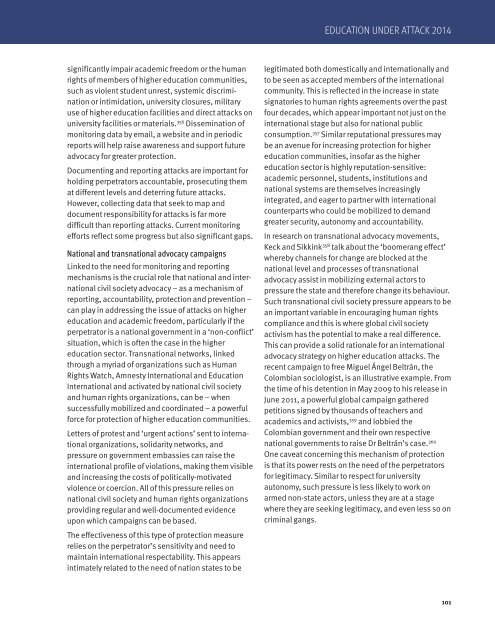Create successful ePaper yourself
Turn your PDF publications into a flip-book with our unique Google optimized e-Paper software.
EDUCATION UNDER ATTACK 2014significantly impair academic freedom or the humanrights of members of higher education communities,such as violent student unrest, systemic discriminationor intimidation, university closures, militaryuse of higher education facilities and direct attacks onuniversity facilities or materials. 356 Dissemination ofmonitoring data by email, a website and in periodicreports will help raise awareness and support futureadvocacy for greater protection.Documenting and reporting attacks are important forholding perpetrators accountable, prosecuting themat different levels and deterring future attacks.However, collecting data that seek to map anddocument responsibility for attacks is far moredifficult than reporting attacks. Current monitoringefforts reflect some progress but also significant gaps.National and transnational advocacy campaignsLinked to the need for monitoring and reportingmechanisms is the crucial role that national and internationalcivil society advocacy – as a mechanism ofreporting, accountability, protection and prevention –can play in addressing the issue of attacks on highereducation and academic freedom, particularly if theperpetrator is a national government in a ‘non-conflict’situation, which is often the case in the highereducation sector. Transnational networks, linkedthrough a myriad of organizations such as HumanRights Watch, Amnesty International and EducationInternational and activated by national civil societyand human rights organizations, can be – whensuccessfully mobilized and coordinated – a powerfulforce for protection of higher education communities.Letters of protest and ‘urgent actions’ sent to internationalorganizations, solidarity networks, andpressure on government embassies can raise theinternational profile of violations, making them visibleand increasing the costs of politically-motivatedviolence or coercion. All of this pressure relies onnational civil society and human rights organizationsproviding regular and well-documented evidenceupon which campaigns can be based.The effectiveness of this type of protection measurerelies on the perpetrator’s sensitivity and need tomaintain international respectability. This appearsintimately related to the need of nation states to belegitimated both domestically and internationally andto be seen as accepted members of the internationalcommunity. This is reflected in the increase in statesignatories to human rights agreements over the pastfour decades, which appear important not just on theinternational stage but also for national publicconsumption. 357 Similar reputational pressures maybe an avenue for increasing protection for highereducation communities, insofar as the highereducation sector is highly reputation-sensitive:academic personnel, students, institutions andnational systems are themselves increasinglyintegrated, and eager to partner with internationalcounterparts who could be mobilized to demandgreater security, autonomy and accountability.In research on transnational advocacy movements,Keck and Sikkink 358 talk about the ‘boomerang effect’whereby channels for change are blocked at thenational level and processes of transnationaladvocacy assist in mobilizing external actors topressure the state and therefore change its behaviour.Such transnational civil society pressure appears to bean important variable in encouraging human rightscompliance and this is where global civil societyactivism has the potential to make a real difference.This can provide a solid rationale for an internationaladvocacy strategy on higher education attacks. Therecent campaign to free Miguel Ángel Beltrán, theColombian sociologist, is an illustrative example. Fromthe time of his detention in May 2009 to his release inJune 2011, a powerful global campaign gatheredpetitions signed by thousands of teachers andacademics and activists, 359 and lobbied theColombian government and their own respectivenational governments to raise Dr Beltrán’s case. 360One caveat concerning this mechanism of protectionis that its power rests on the need of the perpetratorsfor legitimacy. Similar to respect for universityautonomy, such pressure is less likely to work onarmed non-state actors, unless they are at a stagewhere they are seeking legitimacy, and even less so oncriminal gangs.101


